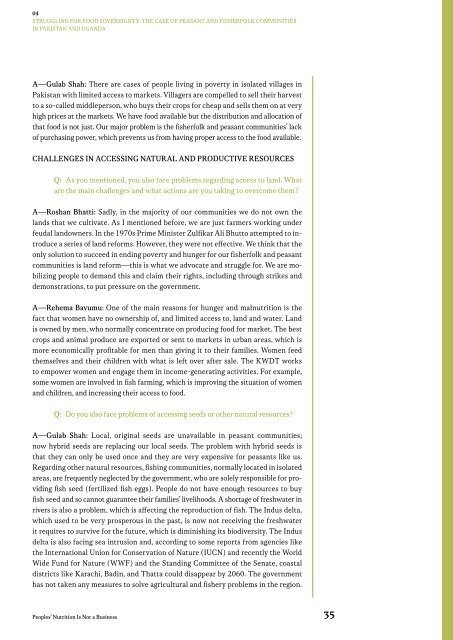RIGHT TO FOOD AND NUTRITION WATCH
1iNBHTY
1iNBHTY
Create successful ePaper yourself
Turn your PDF publications into a flip-book with our unique Google optimized e-Paper software.
04<br />
STRUGGLING FOR <strong>FOOD</strong> SOVEREIGNTY: THE CASE OF PEASANT <strong>AND</strong> FISHERFOLK COMMUNITIES<br />
IN PAKISTAN <strong>AND</strong> UG<strong>AND</strong>A<br />
AAGulab Shah: There are cases of people living in poverty in isolated villages in<br />
Pakistan with limited access to markets. Villagers are compelled to sell their harvest<br />
to a so-called middleperson, who buys their crops for cheap and sells them on at very<br />
high prices at the markets. We have food available but the distribution and allocation of<br />
that food is not just. Our major problem is the fisherfolk and peasant communities’ lack<br />
of purchasing power, which prevents us from having proper access to the food available.<br />
CHALLENGES IN ACCESSING NATURAL <strong>AND</strong> PRODUCTIVE RESOURCES<br />
Q:<br />
As you mentioned, you also face problems regarding access to land. What<br />
are the main challenges and what actions are you taking to overcome them?<br />
AARoshan Bhatti: Sadly, in the majority of our communities we do not own the<br />
lands that we cultivate. As I mentioned before, we are just farmers working under<br />
feudal landowners. In the 1970s Prime Minister Zulfikar Ali Bhutto attempted to introduce<br />
a series of land reforms. However, they were not effective. We think that the<br />
only solution to succeed in ending poverty and hunger for our fisherfolk and peasant<br />
communities is land reform—this is what we advocate and struggle for. We are mobilizing<br />
people to demand this and claim their rights, including through strikes and<br />
demonstrations, to put pressure on the government.<br />
AARehema Bavumu: One of the main reasons for hunger and malnutrition is the<br />
fact that women have no ownership of, and limited access to, land and water. Land<br />
is owned by men, who normally concentrate on producing food for market. The best<br />
crops and animal produce are exported or sent to markets in urban areas, which is<br />
more economically profitable for men than giving it to their families. Women feed<br />
themselves and their children with what is left over after sale. The KWDT works<br />
to empower women and engage them in income-generating activities. For example,<br />
some women are involved in fish farming, which is improving the situation of women<br />
and children, and increasing their access to food.<br />
Q:<br />
Do you also face problems of accessing seeds or other natural resources?<br />
AAGulab Shah: Local, original seeds are unavailable in peasant communities;<br />
now hybrid seeds are replacing our local seeds. The problem with hybrid seeds is<br />
that they can only be used once and they are very expensive for peasants like us.<br />
Regarding other natural resources, fishing communities, normally located in isolated<br />
areas, are frequently neglected by the government, who are solely responsible for providing<br />
fish seed (fertilized fish eggs). People do not have enough resources to buy<br />
fish seed and so cannot guarantee their families’ livelihoods. A shortage of freshwater in<br />
rivers is also a problem, which is affecting the reproduction of fish. The Indus delta,<br />
which used to be very prosperous in the past, is now not receiving the freshwater<br />
it requires to survive for the future, which is diminishing its biodiversity. The Indus<br />
delta is also facing sea intrusion and, according to some reports from agencies like<br />
the International Union for Conservation of Nature (IUCN) and recently the World<br />
Wide Fund for Nature (WWF) and the Standing Committee of the Senate, coastal<br />
districts like Karachi, Badin, and Thatta could disappear by 2060. The government<br />
has not taken any measures to solve agricultural and fishery problems in the region.<br />
Peoples’ Nutrition Is Not a Business 35


